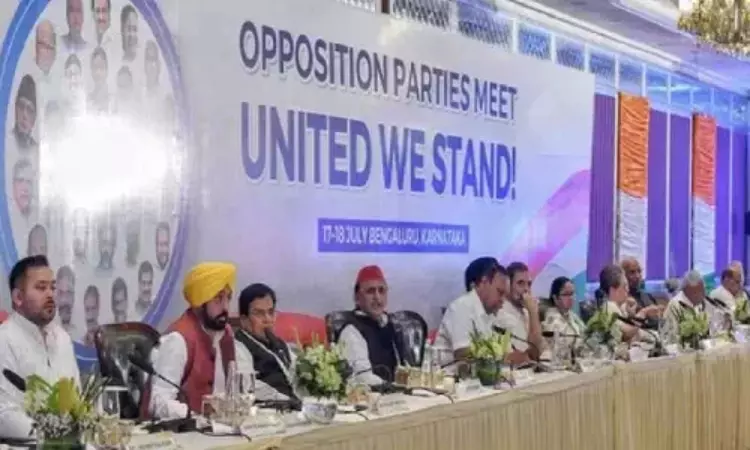Clutching at straws
INDIA has no leader to match Modi, the whole idea of reducing the Indian election, or any election, to a clash of titans is risible.

Indian National Developmental Inclusive Alliance
NEW DELHI: The third meeting of the Indian National Developmental Inclusive Alliance (INDIA) last week declared that the 26 parties comprising the front would fight next year’s general election together but added the qualifier “as far as possible”.
Seat-sharing arrangements in different states will take place “in a collaborative spirit of give-and-take”, it said. This approach of treading carefully is
wise; and resisting the temptation to be grandil- oquent is tactically sound. In a similar vein, the
slogan adopted by the alliance, ‘Judega Bharat, Jeetega India’, is a sober coinage akin to the almost pedestrian “a government that works” slogan that put an end to the BJP’s India Shining appeal in 2004. All in all, this is quite a contrast from the BJP’s shrill pitch of faux patriotism and sectional discord.
To those who desire a more confrontational approach, replete with insulting rhetoric and personal attacks, this level-headed strategy may seem timid. But INDIA does not have to play the BJP’s game.
Today, Narendra Modi dominates national politics, and the BJP plans to make the election all about him. To meet that challenge with a like response would be self-defeating, as we saw in the 2019 elections.
Apart from the fact that INDIA has no leader to match Modi, the whole idea of reducing the Indian election, or any election, to a clash of titans is risible.
No nation’s fortunes should hinge upon a gladiatorial contest between two humans, however wise or valorous. INDIA’s Mumbai meet said it would work under the principle of collective leadership rather than pin its faith on any one leader, or PM candidate, for now. Critics might see this as a failure to offer
an alternative to Modi and tantamount to elector- al suicide, but there is evidence in India’s history
that voters are not in any thrall to the strongman syndrome. Titans like Indira Gandhi, Rajiv Gandhi and Atal Bihari Vajpayee have been bested by the union of regional parties led by men whose support was limited to their respective state.
This fact obeys a basic principle of India’s politics since Independence: Power in our new nation is a tussle between one national entity and disparate provincial forces. Challenges to the pre-eminent party ruling in New Delhi come from regional coalitions rather than alternative national formations. The Janata Party in 1977 and the Janata Dal in 1989 were both composites of parties with regional support.
No national party has been dislodged by another truly national party in Independent India. To smirk at the prospect of 26 parties tilting at the behemoth BJP ignores this functional principle. Therefore, it may be hasty for the BJP to ridicule INDIA as a rag-tag patchwork coalition. It may seem far-fetched that 26 ideologically disparate parties, some of which compete fiercely in some states, could come up with a viable seat-sharing arrangement.
But there is evidence in our electoral data that when faced with a united opposition, national parties have fallen. In 1988, the Janata Dal came into being to defeat the Congress of Rajiv Gandhi. It was a coalition of the Jan Morcha, Janata Party, Lok Dal and Congress (S). To defeat the Congress, it came to an agreement with the BJP not to contest against each other in 85% of seats.
It came to a similar agreement with the Left Front. The strategy worked. The Congress Party’s seats in the Lok Sabha dwindled from 404 in 1984 to 197 in 1989. This precedent must inspire hope in the INDIA’s leaders as they begin their seat arrangement negotiations.



